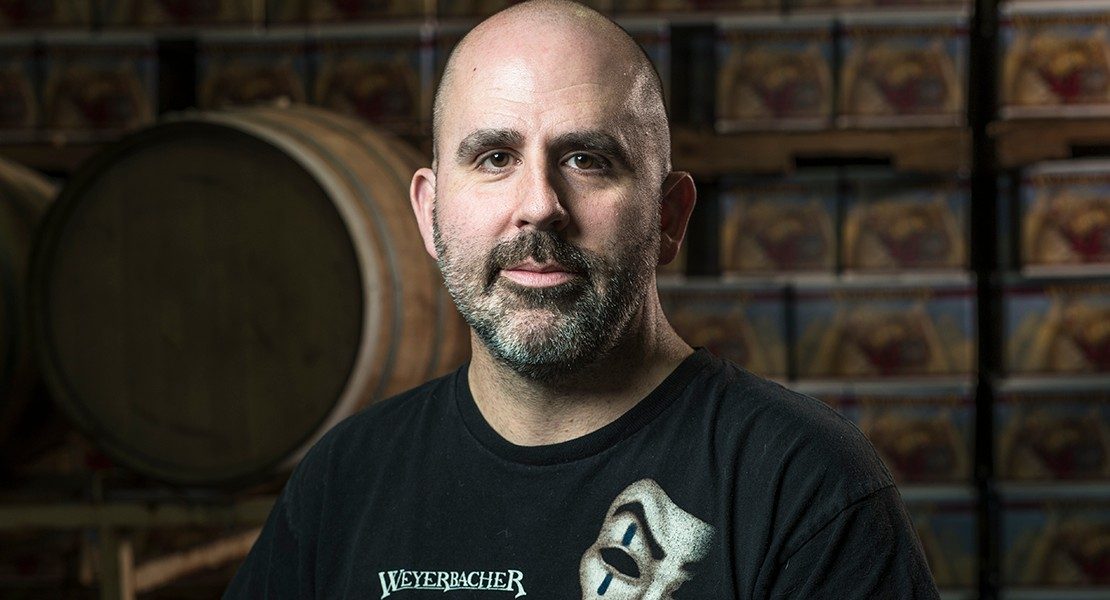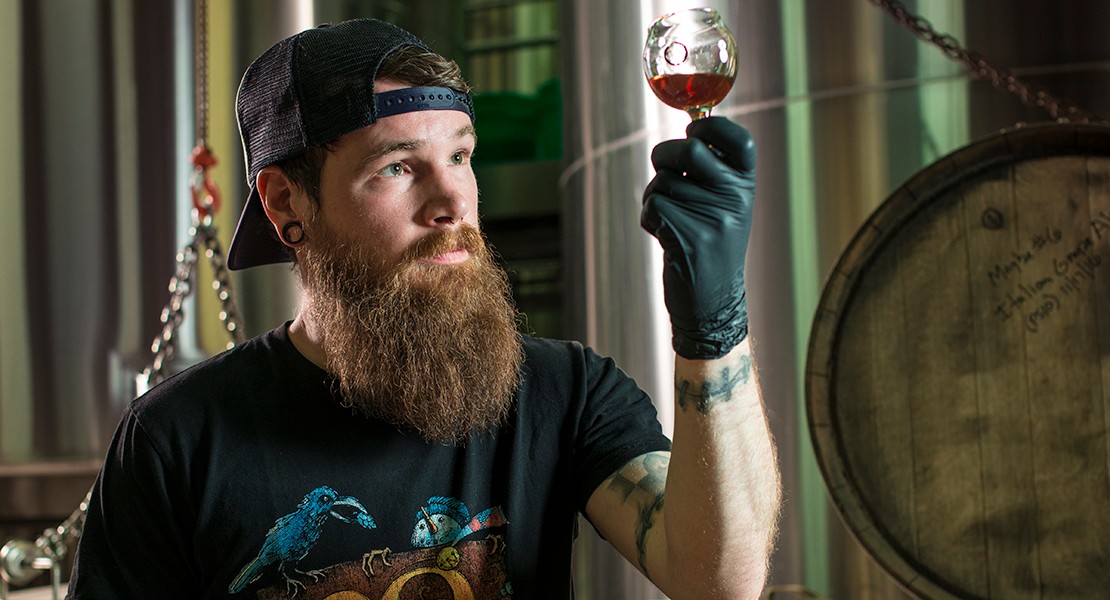So You Want to Be a Brewer

Meet Chris Wilson
Weyerbacher Brewmaster
With a degree in physics, Chris was working on liquid crystal displays at the U.S. Naval Research Laboratory until he and his wife headed to the West Coast for her to attend graduate school. A year of being unable to find work in California later, Chris announced that he was going to get a job in a brewery—two weeks later, he was brewing beer at Bayhawk Ales in Irvine. “I was actually brewing by myself after 14 days, which isn’t ideal,” he recalls, laughing. “But they were desperate!” After literally getting his feet wet in the brewery world, he completed his formal education at the Master Brewers Program at UC Davis before returning to the East Coast and scoring an opportunity at Weyerbacher, where he has been for more than a decade.
Meet Matt Snyder
Weyerbacher Lead Brewer and Pilot System Manager
As a home cook and DIY enthusiast, Matt’s interest in craft beer naturally led him to start home brewing. After 11 years of retail management, he decided it was time for a career change to either cooking or brewing. Tired of working nights and weekends, cooking in a restaurant was out, so he completed a brewing program through the American Brewers Guild in Vermont and a five-week apprenticeship at Weyerbacher. With his foot in the door, he was hired to work on the packaging line, and quickly worked his way up to become the lead brewer.
* * *
According to the Brewers Association, the majority of Americans live within 10 miles of a craft brewer, and the Lehigh Valley is no exception—consider HiJinx, Fegley’s Brew Works, Two Rivers, Funk, Yergey, Golden Avalanche, and Saucony Creek, to name more than a few. With such a local level of fermented fervor, it’s likely that you’ve found yourself sitting on a stool in one of these taprooms, pint in hand, perhaps wondering if you could parlay your affinity for stouts into a career as a brewer.
I talked to Weyerbacher Brewing Company’s brewmaster and lead brewer to find out what it takes to create great beer for a living. Hint: one of them describes the job as “half plumber and half janitor” and the other almost fell off the equivalent of a two-story building while on the job.
According to the Brewers Association, the majority of Americans live within 10 miles of a craft brewer, and the Lehigh Valley is no exception—consider HiJinx, Fegley’s Brew Works, Two Rivers, Funk, Yergey, Golden Avalanche, and Saucony Creek, to name more than a few. With such a local level of fermented fervor, it’s likely that you’ve found yourself sitting on a stool in one of these taprooms, pint in hand, perhaps wondering if you could parlay your affinity for stouts into a career as a brewer.
I talked to Weyerbacher Brewing Company’s brewmaster and lead brewer to find out what it takes to create great beer for a living. Hint: one of them describes the job as “half plumber and half janitor” and the other almost fell off the equivalent of a two-story building while on the job.
First of all, are there any misconceptions about breweries that you’d like to clear up?
Chris: The big one is that a lot of people think it’s all fun and games—like we just sit around and drink beer all day. Outside of taking a sip to check for quality, we don’t drink at all during the day for safety reasons, and because we don’t want to mess anything up. If you’re looking to drink on the job, this isn’t it.
What credentials do you need to be a brewer?
Chris: To brew at Weyerbacher, you need to have completed a program at one of the brewing schools, such as UC Davis, Institute of Brewing and Distilling, Siebel Institute, or American
Brewers Guild.
Matt: At some breweries, you can work your way up, but certification is important—it ensures you understand why you’re doing what you’re doing.
Do you need a strong science background?
Chris: You don’t necessarily need a degree in biochemistry to become a brewer, but you need to have the capacity to learn some of these concepts—there’s complex biochemistry that occurs during the brewing process. Prerequisites for certification programs include precalculus and a solid science foundation, like college-level chemistry, biology, and physics.
What’s the biggest challenge of making beer?
Chris: The customers, and their desire for constant change. Now, as a customer, I have the same desires, so I understand. But there’s definitely pressure to always be changing. Customers don’t want to drink the same beer every time they come—the idea of making one beer your flagship beer is changing. You can’t rest on your laurels. You have to be on the ball.
Matt: We do 25-30 styles of beer per year, so scheduling is a challenge. We schedule the brews and communicate with the entire staff—sales, marketing, and executives.
What’s something most people wouldn’t know about working in a brewery?
Chris: It’s extremely dangerous. There are high-pressure water systems, steam, chemicals, and a lot of things that could literally kill you if you don’t know what you’re doing. If you just walk blindly into a brewery, you’ll probably get really hurt.
It’s also difficult to get a consistent product, and going from a home brew scale to a production scale is complicated. Even if you start with the same materials each time, you’re not guaranteed to get the same product every time. Your malt, your water temperatures, and your yeast health are all crucial to what your end product is going to be like.
Matt: There is a ton of CO2 in the brewery. If you do something wrong, you could very quickly get yourself into a situation where there is no air to breathe.
Burns are another concern—180 degree liquids and boil overs are no joke.
What’s your favorite Weyerbacher brew?
Chris: Almost always whatever is new, but probably Line Street. It’s a German Pilsner with an American spin, so we put some American hops in it.
Matt: Hop Rotation #2, an East Coast IPA—it’s hazy with a decent mouthfeel.
What’s the craziest thing that has happened on the job?
Chris: The brewery was robbed! I was working by myself late at night, and it was the middle of summer, so I had the doors open. I saw a guy’s foot sticking out from behind a stack of beer, and he was stealing a stack of copper.
Matt: I almost fell off a scissor lift. I took hardware off of a pressurized vessel—it wasn’t supposed to be pressurized, but I didn’t check. There was a tank that was pressurized and I took a piece of hardware off. Well, it went whizzing past my head, and I was 25 feet off the ground on a scissor lift.
What’s the best part of the job?
Chris: It’s a fun industry. Everyone is working together to make a product that I really like—and I like beer more than just drinking it. It’s something so simple in appearance, but there are so many details.
Matt: I love the creative process. Brainstorming with the other guys and coming up with new recipes and processes is kind of an art. It’s great when you strike gold with an off-the-wall recipe.
What’s the least glamorous part of the job?
Chris: Cleaning. It’s hot, and you’re always doing it. We all clean the floors and the bathrooms here. When you’re a brewer, you’re also half plumber and half janitor.
Matt: Cleaning. Four words: purging fermenters of yeast.
What advice would you give to someone who wants to be a brewer?
Chris: Go work for a brewery in any capacity so you can see what it’s really like—part of it is hours of stacking a bunch of cases by hand.
Matt: Be prepared to work hard and pay attention.
Weyerbacher Brewing Company
905 Line St
Easton
610.559.5561
weyerbacher.com















